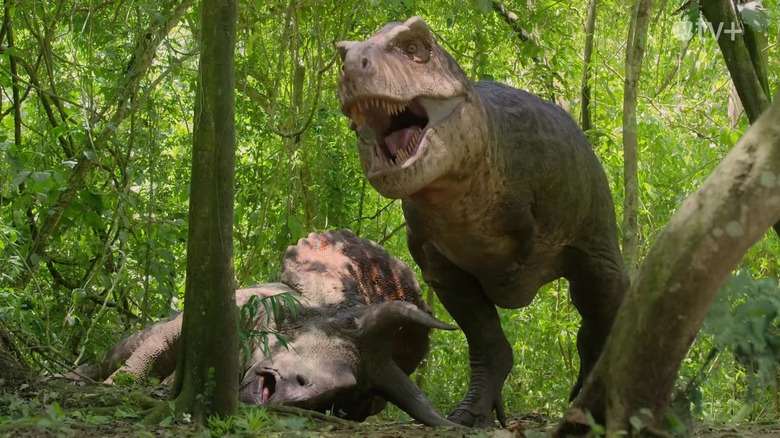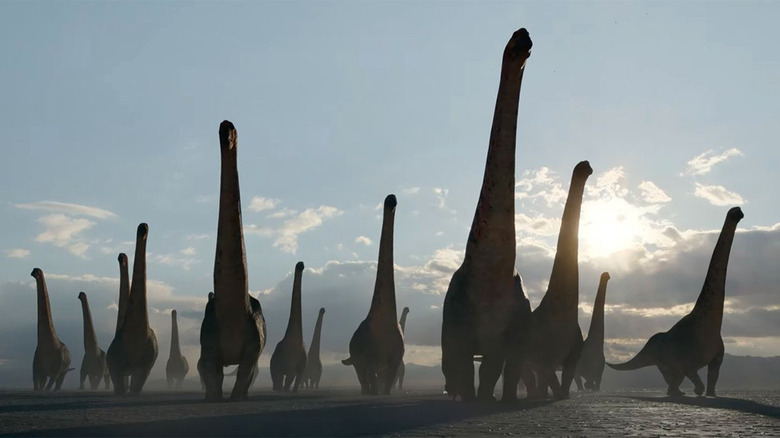Prehistoric Planet Review: Jon Favreau And David Attenborough Deliver A Docuseries For The Ages
A mighty Tyrannosaurus rex swimming; a ferocious Velociraptor flexing its deadly, distinctive claw; Suropods showing off bulbous neck sacks — these are just some of the stunning visuals in the trailer for "Prehistoric Planet," the new Apple TV+ documentary series about life on Earth "66 million years ago."
This might be the most ambitious nature documentary to date: produced by Jon Favreau and Mike Gunton for BBC Studios Natural History Unit ("Planet Earth") and narrated by Sir David Attenborough, the new docuseries is epic in every sense of the word. The visuals reflect the best available technology — and the content, the most interesting and up-to-date theories from paleontologists. Heck, even the music is by Academy Award-winner Hans Zimmer. As another Attenborough known for his work with dinosaurs once said, they "spared no expense."
"Jurassic Park" jokes aside, "Prehistoric Planet" is, in many ways, a spiritual successor to the groundbreaking, 2006 BBC TV documentary series "Planet Earth." That nature documentary rewrote the rules: it was shot in high-definition, it was incredibly expensive, and it won a ton of awards. Like "Planet Earth," "Prehistoric Planet" aims to delight and surprise. The unbelievably weird-looking pterosaurs, which have enormous beaks and wings that fold backward for walking on like giant canes; the majestic plesiosaur cresting massive freshwater lakes to gobble up desperately leaping fish; the nimble (and very bird-like) velociraptor gliding and skipping down an impossibly steep cliff; the massive titanosaur, fighting for dominance in the herd — all gloriously rendered in ultra-realistic CGI. It's breathtaking.
Planet Earth like you've never seen it before
Great lengths are taken in "Prehistoric Planet" to make the footage as immersive as possible, offering a believable (if unique) view of life millions of years ago. In episode 2 "Deserts," there's a shot from inside of a Sauropod carcass of Pterosaurs, pecking at the rotting flesh. When one of the hungry reptiles gets too close to the "camera," the screen jiggles. Later in the same episode, plants are shown growing in a once arid region, and rather than smoothly animating the growth, audiences are treated to a time-lapse shot often found in BBC nature documentaries. It's the attention to detail in moments like these that make it easy to forget — if only momentarily — that what we're watching is completely man-made.
This is a thoughtfully produced series. The violence is handled well — unlike some other similar documentaries (I had to turn off "Dinotasia," the 2012 movie narrated by Werner Herzog, because the high level of gore was inappropriate for my kids). For example, rather than showing a beloved triceratops getting ripped to shreds by a T Rex, "Prehistoric Planet" shows blood dripping off of leaves and a fly landing on an unblinking eye — signaling what's going on to knowing viewers, leaving the young ones blissfully unaware. Potentially upsetting moments — like babies getting eaten (this is a nature documentary, so that's to be expected) — are framed at a distance. Having said that, the events don't come across as sanitized or dumbed-down either.
This is definitely a series that people of all ages can enjoy. The music is perfect, oscillating from lofty to jolly to solemn and back again. A high point is a particular courtship display in episode 5, "Forests." The moment is a bit unexpected, and the score sets the tone superbly. Even the most joyless viewer couldn't watch that scene and not crack a smile.
An entertaining look at the cretaceous period
Attenborough sounds to be having the time of his life narrating the CGI action in "Prehistoric Planet," putting the right amount of amusement in lines like, "The facial area of a Tyrannosaur is very sensitive to touch. And they nuzzle." (Admittedly, the romantic closeups on the dinos' faces during the mating scene — their bodies tastefully obscured by leaves and shadows, of course — is a bit much. I blushed.) His tone can be bemused, dramatic, or deadly serious — providing some emotional depth to the action onscreen. Attenborough really is the best in the biz when it comes to narrating nature documentaries (sorry Oprah Winfrey), and he brings his A-game here.
The thematic divisions were clever and worked well, demonstrating the prehistoric creatures in an ecology; however, the lines between what is speculative, what is certain, and what is creative license is really unclear — and that hurts the series as a pedagogical tool. Overall, it felt more geared towards entertainment than education. Scope is a bit of an issue here too: while some scenes were great for demonstrating the relationships between various creatures in the ecosystems, others felt very isolated and overly focused on one particular species. This is made worse by how similar all the pterosaurs look — and how much time is spent on enormous colonies of them on barren cliffs and beaches.
Overall, the series struggles a bit from a lack of usable information. As the mother of a particularly prehistoric-preoccupied three-year-old, I have a pretty good ear for terms like "Camptosaurus" and "Stygimoloch," which are mumble-spoken on a daily basis. But even I had trouble keeping track of what species was onscreen, how big they were, and where in the world the action was happening. I often wished that information would appear as text at the bottom, if only for a minute, just to help me keep track.
Even with those minor annoyances, "Prehistoric Planet" was an absolute joy to watch. It satisfied the aspiring paleontologist in me, as well as my inner child. I only wish that I had had the opportunity to see the series on an IMAX screen — these kind of lush, photorealistic displays of grandiose beings are just begging to be shown on the best, and biggest, screens available.
/Film Rating: 8 out of 10
"Prehistoric Planet" premieres as a five-day event, with a new episode dropping daily from Monday, May 23 through to Friday, May 27, on Apple TV+.

